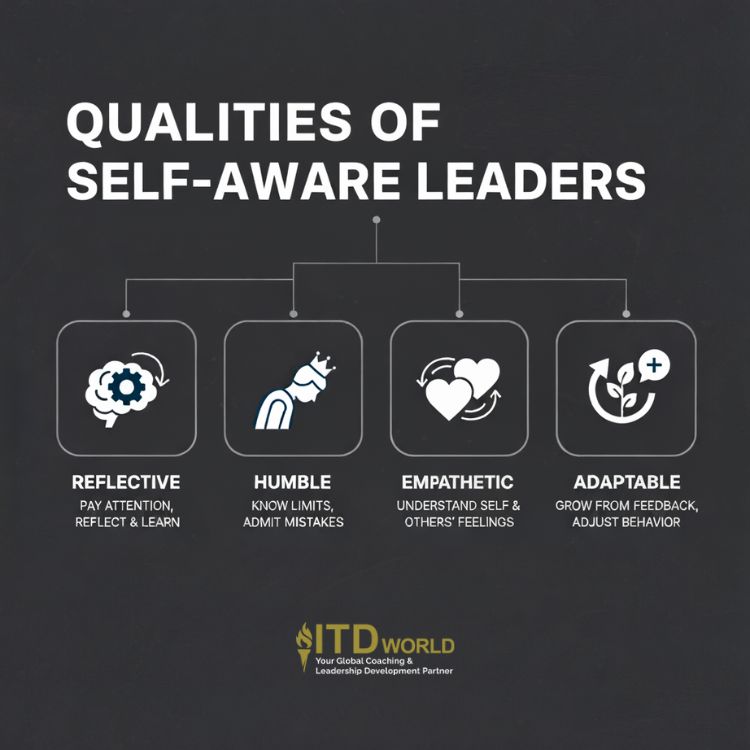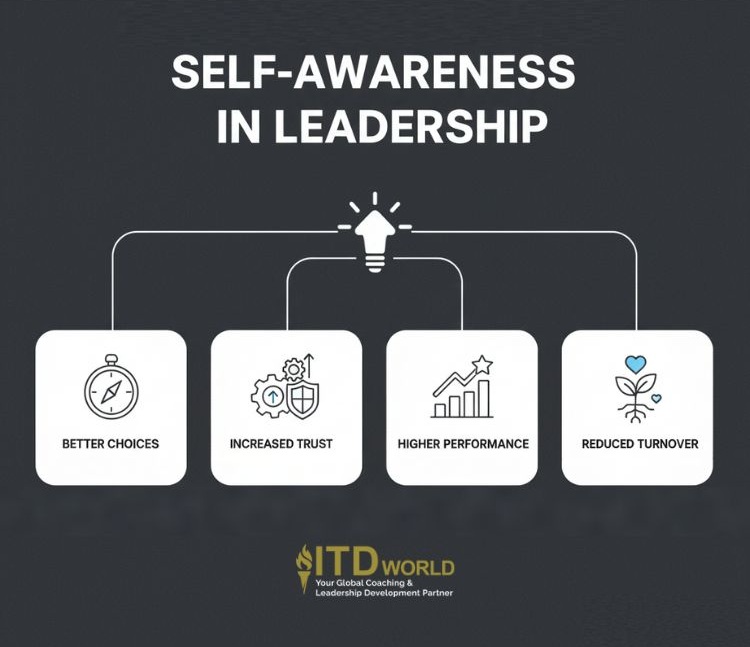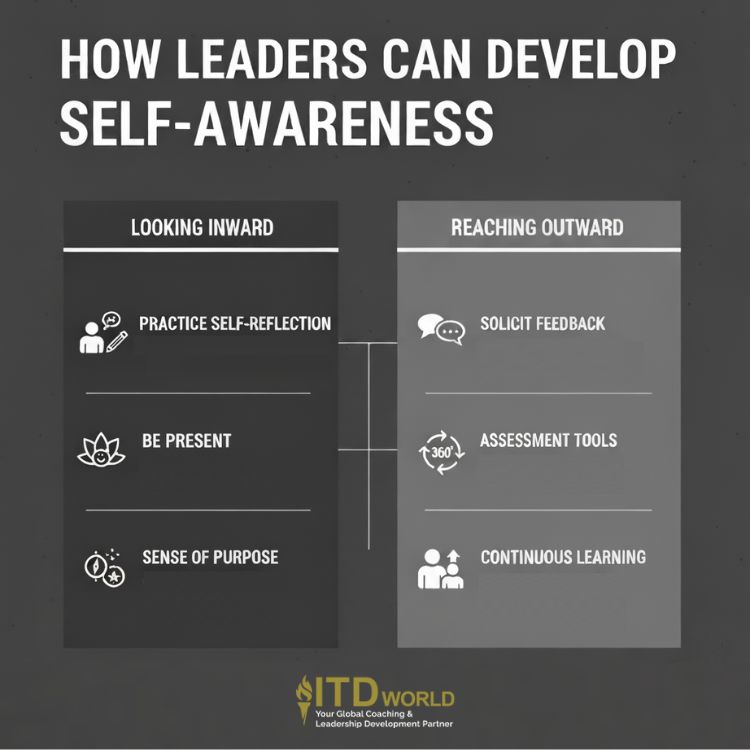Learn about the importance of self-awareness in leadership; how it fuels growth, resilience, and authentic team relationships.
Former Honeywell CEO Lawrence Bossidy once said, “Self-awareness gives you the capacity to learn from your mistakes as well as your successes. It enables you to keep growing.” Indeed, this is especially true for those in management positions. More than a passive “soft skill,” self-awareness in leadership is the foundational competency upon which all other leadership capabilities are built. It is the engine for personal growth, resilience, and the ability to maintan authentic, trusting relationships with the team.
|
Author: Jonathan M. Pham |
Highlights
- Leadership self-awareness is a leader’s objective understanding of their values, passions, strengths, weaknesses, thoughts, feelings, and behaviors, coupled with an appreciation for how they are perceived by and impact others.
- Deep self-awareness enables them to understand their impact, make authentic and informed decisions, foster trust and psychological safety within their teams, and ultimately drive higher performance and retention.
- According to organizational psychologist Tasha Eurich, self-awareness in leadership comprises two equally vital perspectives: internal (understanding one’s own inner world) and external self-awareness (comprehending how others perceive you and your impact on them).
- Developing self-awareness in leadership involves both looking inward through practices like daily self-reflection, journaling, mindfulness, and connecting to one’s purpose, and reaching outward by actively soliciting feedback, utilizing formal assessment tools, and embracing continuous learning through coaching or mentorship.
- To foster a culture of self-awareness, it is crucial that organizations normalize feedback, promote individuals who lead by example, invest in development tools, and integrate “in-action” reflection into daily workflows.
- Despite its importance, maintaining self-awareness in leadership is challenging due to problems such as the “busyness” trap, the fear of confronting one’s own flaws, and the tendency to create an “echo chamber” of similar perspectives.
What is Self-awareness in Leadership?
Leadership self-awareness is the ability for leaders to see themselves clearly and objectively. It involves a deep understanding of one’s own values, passions, strengths, and weaknesses – as well as one’s thoughts, feelings, and behaviors. Most importantly, it includes an appreciation for how one is perceived by those around them and their real-time impact on others.
Characteristics of self-awareness in leadership:
- Observant & reflective: They pay attention to their inner state and regularly take time to reflect on their actions and their outcomes.
- Humble: They are well aware of their limitations and are not afraid to admit when they are wrong or don’t have the answer.
- Empathetic: Attunement to their own feelings makes them better equipped to realize and connect with those of other people.
- Adaptable & open to feedback: They view constructive feedback not as a personal attack, but as lessons for growth, and are willing to adjust their behavior accordingly.

It’s worth noting that there is a crucial distinction between “self-awareness” and “self-management“. The core principle to remember is: you cannot manage what you are not aware of. Self-awareness is the necessary first step that makes effective self-management possible.
| Aspect | Self-Awareness |
Self-Management
|
| Core Function | Perception: Seeing yourself and the situation clearly. |
Action: Choosing your response based on that perception.
|
| Key Question | “What am I feeling/thinking right now, and why?” |
“Given what I’m feeling, what is the most constructive way to act?”
|
| Example | “I am aware that I feel frustrated because the project is behind schedule.” |
“Because I know I am frustrated, I will take a moment to calm down before speaking to the team about the delay.”
|
Why is Self-awareness in Leadership Important?
A common question in leadership circles is, “Can a leader truly grow without self-awareness?” The short answer is NO. Without self-knowledge, one will be operating in the dark – unable to know about their own performance-limiting habits, understand their true impact on others, or recognize where they need to adapt their approach.
The disastrous consequences of a lack of leadership self-awareness are well illustrated by the Wells Fargo account fraud scandal of the 2010s. The senior leadership team espoused values of customer service while simultaneously creating a high-pressure sales culture with unrealistic targets. Their ignorance of the toxic impact this had on employees led to widespread unethical behavior, with thousands of employees creating fake accounts to meet quotas. The result was a catastrophic breakdown of trust, massive financial penalties, and years of damage to the company’s reputation.
In fact, the connection between a leader’s self-awareness and their effectiveness is supported by extensive research.
- Better choices & authenticity
Self-awareness is the foundation of authentic leadership. It allows one to understand their core values and aversions, enabling them to make more informed and principled decisions. In other words, they are equipped to lead from a place of strength and integrity rather than reacting from a place of insecurity.
- Increased trust & psychological safety
Self-aware leaders are better able to practice empathy and compassion – they understand how their mood and actions impact team morale. This creates a high-trust environment that reduces unnecessary conflict, encourages open communication, and boosts collaboration.
- Higher performance & retention
Better decisions and more engaged teams translate directly to higher productivity and innovation. In fact, studies have consistently revealed a strong correlation between self-awareness and success in leadership positions.
Furthermore, top talent is far more likely to stay and thrive under a leader who is humble, open to feedback, and genuinely invested in their team’s well-being, which significantly reduces costly turnover.

Importance of self-awareness in leadership
The Two Sides of Self-Awareness
Back in the day, organizational psychologist Tasha Eurich proposed that self-awareness in leadership is essentially a balance of two distinct and equally important perspectives: how one sees oneself, and how others see them.
-
Internal self-awareness
Internal self-awareness is the clarity with which you see your own inner world. It involves a deep understanding of your personal values, passions, aspirations, strengths, weaknesses, and behavioral patterns – the foundation for establishing your personal leadership brand and identity. It answers the questions: “Who am I?” and “What do I stand for?”
A high degree of internal self-awareness is a cornerstone of emotional intelligence, as it enables you to be attuned to your own feelings, biases, and motivations – which is the first step toward managing them.
-
External self-awareness
External self-awareness means understanding how other people view you across those same dimensions. It is about knowing the impact you have on those around you, regardless of your intent. A leader with strong external self-awareness can accurately gauge the “mood of the room,” understand how their communication is being interpreted, and adapt their approach accordingly.

Emotional intelligence and self-awareness in leadership
The ultimate goal for any leader is to be competent in both internal and external self-awareness. When these two factors are out of balance, it can lead to predictable leadership challenges, as illustrated by the following four archetypes:
- The Introspector (High Internal, Low External): One who is clear on their values but don’t realize how their actions impact others.
Example: A leader who is deeply committed to “excellence” (internal value) but is unaware that their blunt, critical feedback style is demoralizing their team (external impact).
- The Pleaser (Low Internal, High External): Those who are so focused on how others perceive them that they lack a strong inner compass – and therefore may change their opinions or decisions to gain approval.
Example: A manager who agrees with every person they talk to, leading to inconsistent direction and a widespread perception that they lack conviction.
- The Seeker (Low Internal, Low External): People who are unclear about who they are and how they are perceived. They often feel stuck, frustrated, or disengaged in their role.
Example: A new manager who is overwhelmed by their responsibilities and has not yet had the chance to define their own leadership style or receive meaningful feedback.
- The Aware Leader (High Internal, High External): This is the “sweet spot” and the goal of development. These leaders know who they are and their impact on others. They are able to lead with authenticity and integrity – while also capable of adapting their tactics to be effective and empathetic.
Read more: Intent vs Impact in the Workplace – How to Close the Gap
A Blueprint for Developing Self-awareness in Leadership
-
Looking inward
Cultivating internal self-awareness requires creating intentional space to engage in introspection, to truly experience one’s own thoughts, feelings, values, and motivations without judgment. This is the foundational work of “knowing thyself.”
- Practice daily self-reflection and journaling
The discipline of regularly pausing to reflect on one’s experiences is the most fundamental habit. Journaling provides a powerful tool to capture these reflections.
How-to: At the end of each day, take just five minutes to answer a few simple but powerful questions: “When was I at my best today, and why?” “When did I feel frustrated or drained, and what was the trigger?” and “Did my actions today align with my core values?”
- Develop mindfulness & presence
With mindfulness comes the ability to observe one’s thoughts and emotions as they arise, rather than being controlled by them, which is a core component of emotional intelligence.
How-to: Sometimes, it can be as simple as starting the day with a five-minute guided meditation using an app, or taking three deep, conscious breaths before entering a high-stakes meeting to clear the mind and become fully present.
- Connect to a sense of purpose
Internal self-awareness is also anchored by a connection to your “why” – a deeper sense of meaning and values that guide you. For some, this can be a form of embracing spirituality in a universal sense.
How-to: This involves clarifying your personal leadership philosophy and frequently connecting your daily work back to that purpose. A robust philosophy serves as a stable inner anchor that allows you to navigate challenges with greater integrity and resilience.
Read more: Spiritual Leadership – A Remedy for Today’s Workplace Woes
-
Reaching outward
All of us have blind spots and therefore cannot achieve full self-awareness in a vacuum. As a result, we must have the courage to see ourselves through the eyes of others – by constantly seeking out and being open to external perspectives.
- Actively solicit feedback
Don’t just say, “I’m open to feedback.” Instead, it is recommended that you proactively and regularly ask for it in a way that makes it easy for others to respond honestly.
Example: Instead of a vague question, ask a trusted colleague: “In that presentation, what is one thing I did that was effective, and one thing I could do to be more persuasive next time?”
- Use formal assessment tools
These tools provide a structured and confidential way to gather comprehensive, multi-source perspectives. The 360-degree assessment is especially ideal for cultivating external self-awareness. It provides confidential input from your manager, peers, and direct reports, allowing you to see your impact from every angle and identify your blind spots.
- Embrace continuous learning
A key way to learn about your impact is through a trusted developmental relationship. Working with a professional executive coach or a mentor provides a safe, confidential space to process feedback, pinpoint unseen patterns in your behavior, and hold yourself accountable for growth.

How Organizations May Foster A Culture of Awareness
For the efforts of individual leaders to be truly sustainable, the organization must establish an ecosystem where self-awareness is not just encouraged, but systemically valued and rewarded.
- Make feedback normal, not scary
Beyond implementing formal 360-degree feedback processes, it is also essential to conduct training in the skills of how to give and receive feedback. Leaders should be encouraged to model this by openly sharing the input they’ve received – as well as the actions they are taking as a result.
Recommended activity: One great team exercise is the “Start, Stop, Continue” retrospective. In a team meeting, each member shares with the leader (and each other) one thing they should start doing, stop doing, and continue doing to be more effective. This creates a safe, structured, and action-oriented feedback loop.
- Promote leaders who demonstrate self-awareness
An organization’s promotion decisions send the clearest possible message about what it truly values. During leadership reviews, it’s crucial to include criteria like “demonstrated ability to receive and act on feedback” or “a track record of developing others based on their needs.” When employees see that humble, curious, and open-minded leaders are the ones who advance, the cultural message is loud and clear.
- Invest in a toolkit for self-awareness
Organizations can accelerate the development of self-awareness by providing their people with access to a range of professional tools and resources. Examples include validated psychometric assessments like the Myers-Briggs Type Indicator (MBTI) or DiSC, corporate wellness programs, and executive coaching to leaders at all levels.
- Encourage “in-action” reflection
The idea is to build moments of reflection directly into the flow of work, turning it from a solo activity into a team ritual. For instance, consider starting key project meetings with a one-minute silent “check-in” for attendees to clarify their intention for the meeting. More formally, it’s also a great idea to implement After-Action Reviews (AARs) after every major project or milestone. This ritual of asking, “What did we learn?” builds a collective muscle for self-assessment and continuous improvement.
Read more: Continuous Learning Culture – The Blueprint for Agility & Resilience

Challenges of Maintaining Self-awareness in Leadership
- The “busyness” trap
This is probably the most frequently cited practical barrier. Leaders are often so consumed by back-to-back meetings, constant emails, and operational fire-fighting that they feel they have “no time” for what can be perceived as “soft” activities like self-reflection or journaling.
Solution: Consider reflection a strategic priority. You must treat your self-awareness practice with the same importance as any other business meeting.
In practice: Schedule appointments with yourself. Block 15 minutes on your calendar at the end of each day or one hour at the end of each week for focused reflection. By making it a recurring, non-negotiable part of your schedule, you signal to yourself and others that this work is essential, not optional.
- The fear of what you’ll find
Actively seeking honest feedback can be intimidating, as it triggers a fear of vulnerability – the worry that our weaknesses or imperfections will be exposed. This fear often manifests as a subconscious resistance to change or a defensiveness against feedback, as our ego works to protect our current self-image.
Solution: Start small. You do not have to dive into the deep end immediately. The key is to begin the process in a way that feels manageable.
Example: Instead of asking your entire team for feedback at once, have a discussion with a single, trusted colleague or mentor who you know has your best interests at heart – and ask them for just one specific piece of constructive feedback. Additionally, working with a professional executive coach provides a confidential and expertly facilitated space to process difficult information and turn it into an actionable growth plan.
Read more: How Weak Leadership Undermine Success
- The echo chamber
It is a natural human tendency to surround ourselves with people who think and act like we do. Over time, especially for successful executive leaders, this is likely to result in an “echo chamber” where dissenting opinions are filtered out – and the individual only hears information that confirms their existing biases, leading to dangerous blind spots.
Solution: Intentionally seek out diversity of thought. You need to actively fight the comfort of the echo chamber by making it a habit to seek out different perspectives.
In practice: In a meeting, make a point of asking the quietest person in the room for their opinion. Try to seek out the perspectives of colleagues from different departments or backgrounds by asking them, “You often see these issues from a different angle. What am I missing here?” Building a diverse network and having the humility to listen to challenging opinions is a powerful way to maintain holistic self-awareness.
Read more: Diversity in the Workplace – Leveraging Differences to Fuel Innovation & Success
Quotes about Self-awareness in Leadership
Check out more quotes about self-awareness here!
Wisdom tends to grow in proportion to one’s awareness of one’s ignorance.
Anthony de Mello
Humility is not about having a low self image or poor self esteem. Humility is about self-awareness.
Erwin McManus
Everything that irritates us about others can lead us to an understanding of ourselves.
Carl Jung
I think self-awareness is probably the most important thing towards being a champion.
Billie Jean King
Great leaders develop through a never-ending process of self-study, self-reflection, education, training, and experience.
Tony Buon
Practice self-awareness, self-evaluation, and self-improvement. Leadership is a matter of how to be, not how to do.
Frances Hesselbein
Real knowledge is to know the extent of one’s ignorance.
Confucius
We take refuge in pride, because we are afraid to tell the truth to ourselves.
Okakura Kakuzo
Knowing yourself is the beginning of all wisdom.
Aristotle
Books about Self-awareness in Leadership
- 🔍 The Self-Aware Leader by John C. Maxwell
Focus: Practical leadership development
Description: Maxwell emphasizes that lack of self-awareness is the biggest barrier to effective leadership. He introduces tools that enable leaders to recognize their strengths and weaknesses, handle criticism gracefully, and empower their teams by leading with clarity and humility.
- 🧠 Insight by Tasha Eurich
Focus: Scientific approach to self-awareness
Description: In her work, Eurich blends psychology and research to demonstrate why most people are not as knowledgable about themselves as they think. In addition, she also presents strategies to improve internal and external self-awareness.
- 🌿 The Untethered Soul by Michael A. Singer
Focus: Inner consciousness and emotional mastery
Description: Though not strictly a leadership book, it’s a transformative read for those wishing to understand their inner dialogue, detach from limiting thoughts, and live with greater presence and peace.
- 🧭 Self-Awareness in Leadership by Derrick Love
Focus: Emotional intelligence and growth mindset
Description: Love explores how leaders can overcome personal insecurities and emotional blocks to lead authentically. On top of that, he also offers actionable tools to energize teams and create a shared vision rooted in self-understanding.
- 💡 The 15 Commitments of Conscious Leadership by Jim Dethmer, Diana Chapman & Kaley Warner Klemp
Focus: Transformational leadership habits
Description: The book outlines 15 commitments with which leaders may shift from reactive to creative mindsets. It’s a roadmap for cultivating self-awareness, accountability, and emotional intelligence in leadership.
- 🔄 Immunity to Change by Robert Kegan & Lisa Lahey
Focus: Overcoming internal resistance
Description: A deep dive into why leaders struggle to change even when they want to. It introduces a framework for identifying hidden competing commitments and nurturing lasting self-knowledge through reflection and feedback.

How ITD World Can Help
At ITD World, we specialize in enabling leaders to build the foundational competency of self-knowledge that unlocks their full potential. Our solutions are designed to provide the structure, data, and expert guidance needed to foster both internal and external self-awareness.
- Executive coaching: Our one-on-one coaching service is ideal for leaders to do deep reflective work, process feedback constructively, and learn how to enhance their impact.
- 360-degree assessment: Our holistic system use validated instruments to give participants the objective, multi-source data they need to see their blind spots and truly understand how they are perceived by their managers, peers, and teams.
- Leadership workshops: ITD World’s targeted workshops focused on critical skills like Emotional Intelligence (EQ), building psychological safety, and giving/receiving feedback equip leaders and their teams with the practical tools to establish a more self-aware and sustainable culture.
Ready to lead with greater clarity, confidence, and impact? Contact ITD World today to learn how our solutions can enhance your leadership self-awareness!
Other resources you might be interested in:
- Servant Leadership: A Transformative Management Philosophy
- Leadership Journey: How to Grow at Every Stage
- Influential Leadership: Influence to Inspire, Lead, and Succeed

